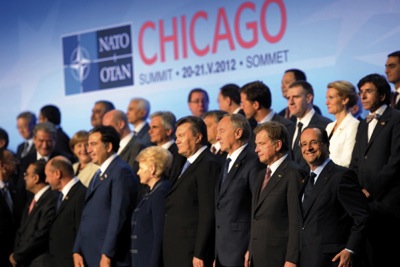"Keep the Russians out, the Americans in, and the Germans down" was the role of NATO in Europe in the words of its first Secretary General, Lord Hastings Ismay. Manlio Dinucci explores the prospects of Atlanticist vassalage that lie ahead following the Chicago summit in May 2012.

NATO has a "unique and essential partner": the European Union. This declaration was made by the Chicago Summit, which also called for a "stronger and more capable European defence." Provided, of course, it is in NATO’s hands and that NATO remains under U.S. command.
What kind of "defense" will NATO provide Europe? To begin with, 22 of the 27 EU member countries are belong to an alliance where the "supreme commander in Europe" is still a U.S. national and is appointed by the President of the USA. Moreover, the Summit confirmed that "NATO’s door remains open to all European democracies that share the Alliance’s values." In other words, after having taken in nine countries from the former Warsaw Pact (including three from the former USSR) and three from the former Yugoslavia, NATO is extending further east, as far as Russia.
The Alliance thus confirmed that "Georgia will become a member of NATO" and that "The Black Sea region continues to be important for Euro-Atlantic security." That is why the presence of NATO warships has escalated in the Black Sea, where in July it will conduct Operation Sea Breeze jointly with the Ukrainian navy. NATO’s military activity, under the ever-present U.S. command, has been even more intense in the former Soviet republics of Estonia, Latvia and Lithuania: naval exercises in the context of Operation Open Spirit were completed on 25 May and BALTOPS will start on June 4 with 30 warships, followed on June 11 by the Saber Strike air force exercises. The Chicago Summit announced that the "air-policing mission" in the Baltic States will continue, meaning that NATO capable aircraft, both conventional and nuclear, will be permanently deployed at the Zokniai air base in northern Lithuania.
Next year the NATO Response Force exercise "Steadfast Jazz" will be held in the Baltic region, which is slated to increase the capacity of the Alliance armed forces to take on "more joint crisis management operations." And while the U.S. continues to modernize its own nuclear devices, stashing them in Europe with those of Britain and France, the NATO Summit expressed "deep concern about the proliferation of nuclear weapons and their means of delivery." It thereby announced the first phase of its "missile defense system," that is to say, the extension to Europe of the U.S. anti-missile "shield": starting with a radar in Turkey, interceptor missiles in Poland and Romania, Aegis ships in the Mediterranean.
Washington avows that the "shield" is not directed against Russia, but is intended to address the threat of Iranian missiles. In Moscow, on the other hand, it is perceived as an attempt to maintain a strategic edge over Russia. The plan envisages the deployment of missiles on Russia’s doorstep, and since they will be under the control of the United States, no one will be able to tell whether they are interceptors or missiles for nuclear attack. Russia has warned that it will take countermeasures, including the installation of a radar and Iskander mobile missiles in the Kaliningrad enclave. Regardless of its actual efficiency, the "shield" is already yielding results: it serves to create new tensions, thus justifying a further strengthening of U.S. management and military presence in Europe. In short, the dominance of the transatlantic partner in Europe.
If this were a marriage, the grounds for divorce would be satisfied.

 Articles by this author
Articles by this author Send a message
Send a message

















Stay In Touch
Follow us on social networks
Subscribe to weekly newsletter